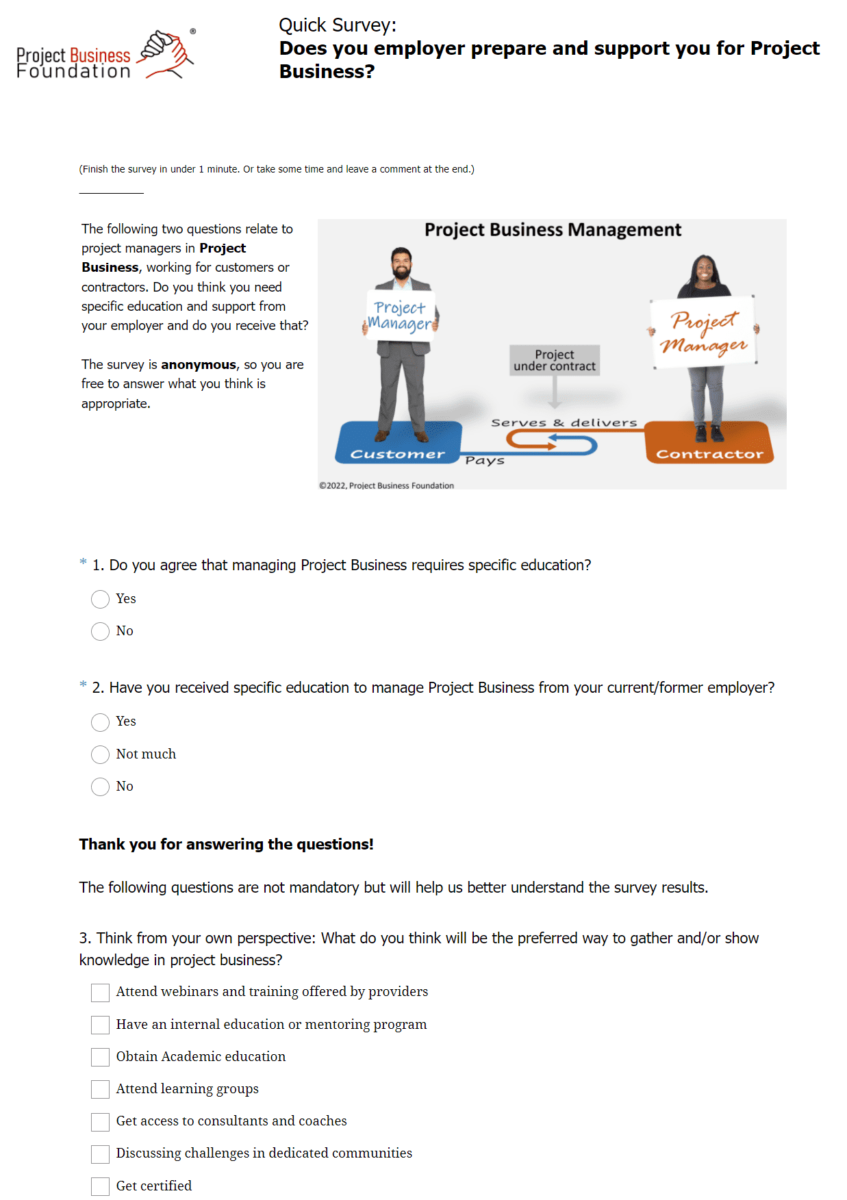
Survey among Practitioners in Project Business Management
Education for Project Business
On this page: Summary ••• 1. Digging Deeper ••• 2. The Need for Education ••• 3. Specific Education ••• 4. Form of Education ••• 5. Roles ••• 6. Project Sizes ••• 7. World Regions ••• 8. Conclusions ••• 9. Comments ••• Appendix: The Method

Summary
9 out of 10 practitioners in Project Business Management emphasized the need for domain-specific education, but only 1/3 said that he or she had received that.
How to reference this page:
Project Business Foundation (2022) Education for Project Business, June [Online]. Available from: https://project-business.org/research/report-education-for-pbm (Accessed: ## #### 202#).

1. Digging Deeper into the Reality of Project Business Management
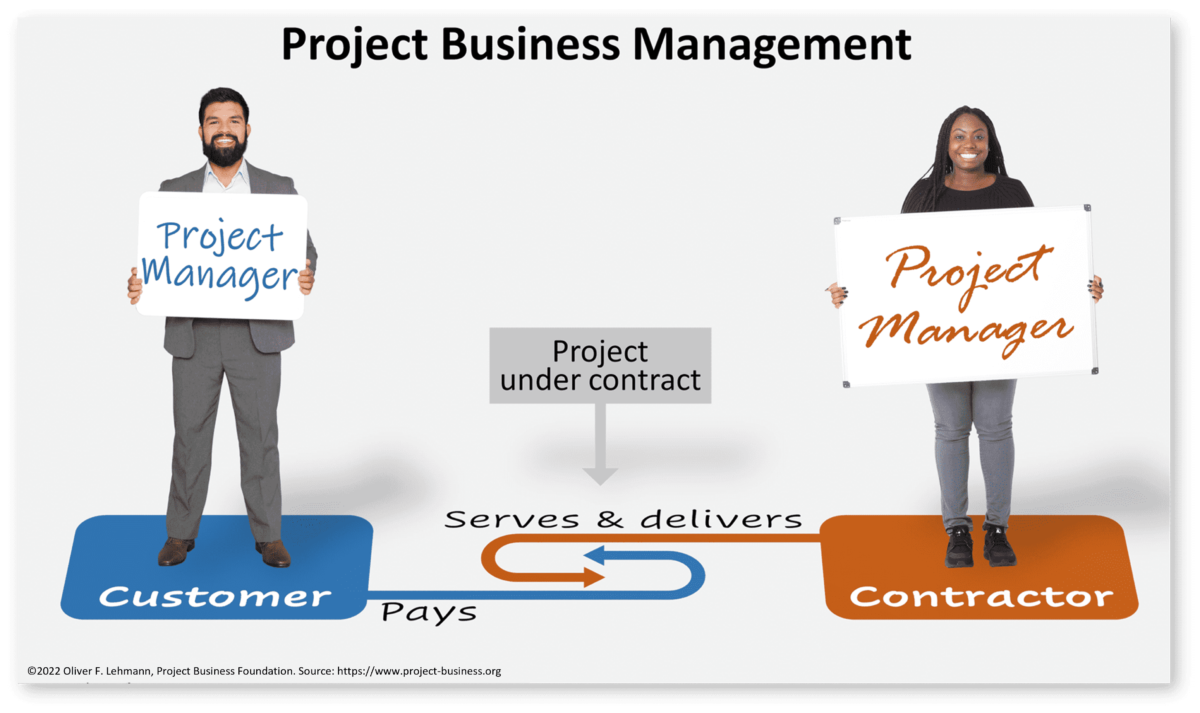
What we already knew: In another study done in 08/2021, respondents reported a solid trend towards Project Business Management :Two of three respondents said that the trend for Make-or-Buy decisions is going towards the Buy option.
65.2% responded that in their projects, contractors do at least half of the project work. In another study from 01/2017, the number was only at 54.8%.
08-2021 Make-or-Buy Study Report
Now, we wanted to know more. A new study gave us insights into the state of education for Project Business Management.

2. The Need for Domain-Specific Education
We wanted to know how well project managers are prepared for the Project Business job. The survey was performed with 534 participants between February 9 and March 3, 2022.
The first question related to the need for the education of professionals in Project Business Management. Here is the result:
Nine out of ten respondents managing Project Business said it requires specific education.
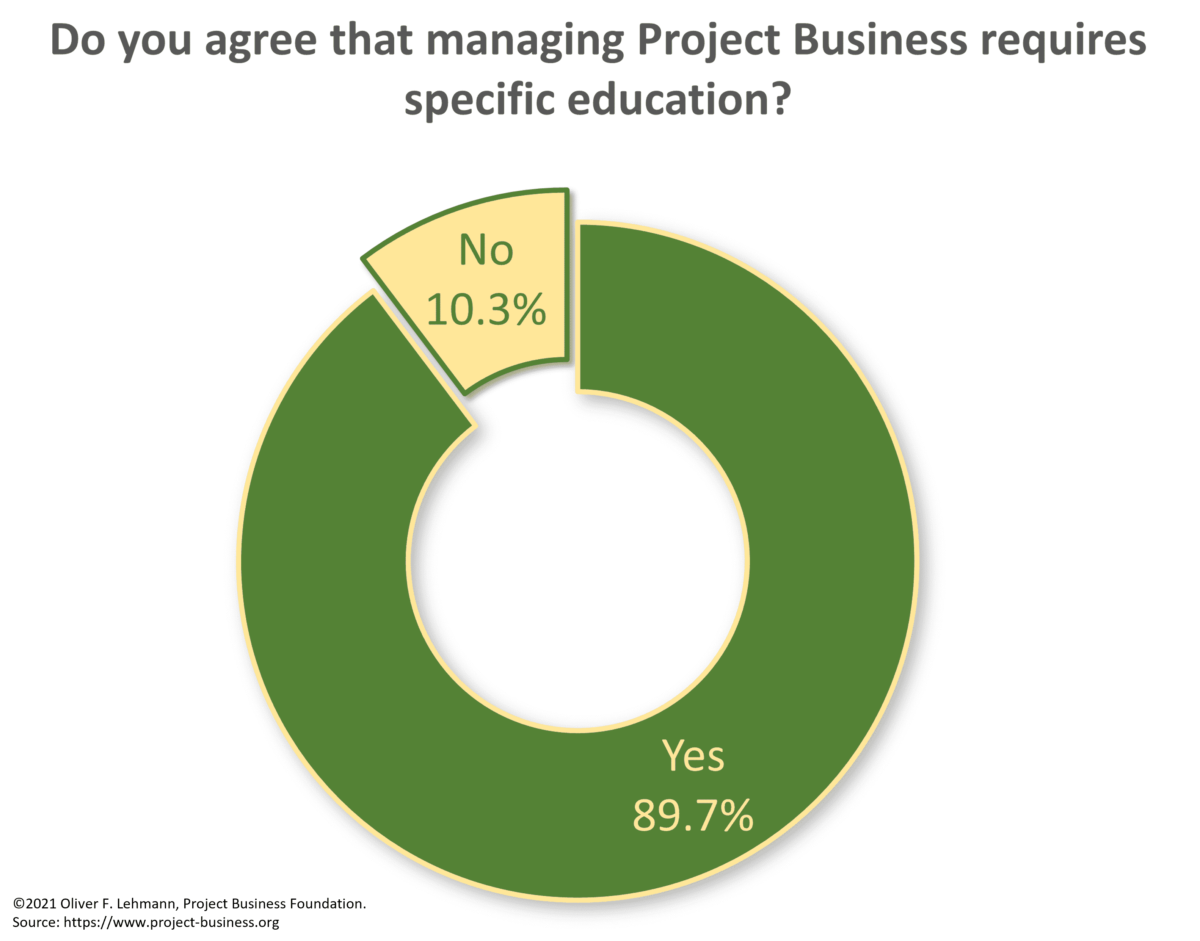

3. Do Project Managers in Project Business Receive Specific Education?
In the next question, we asked whether the project managers have received this education.
One out of three respondents said that they had specific training in Project Business Management.
Two third of the respondents said they had not much or no training at all for the job. The “No specific education” was actually the largest group of all.
Obviously, practitioners in Project Business Management are expected to learn by trial and error, but trial in Project Business is expensive, and error even more.
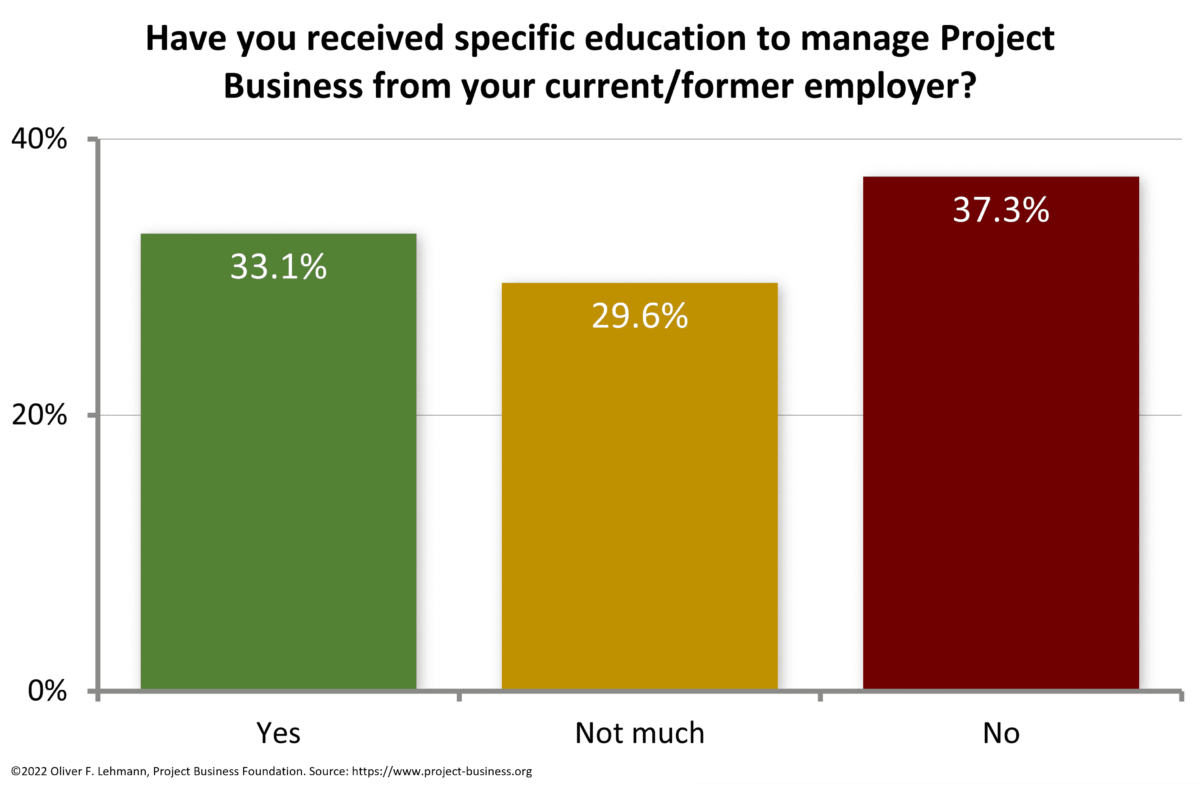

4. Form of Specific Education
The following questions were voluntary.
This question had 514 responses:
Our next question referred to the preferred way of learning domain-specific knowldege.
The preferences were:
- Webinars and training offered by external providers
- Internal education and mentoring programs
- Certification
- Consulting and coaching
- Dedicated discussion communities
- Learning groups
- Acedemic education
Note: Respondents could select multiple options.
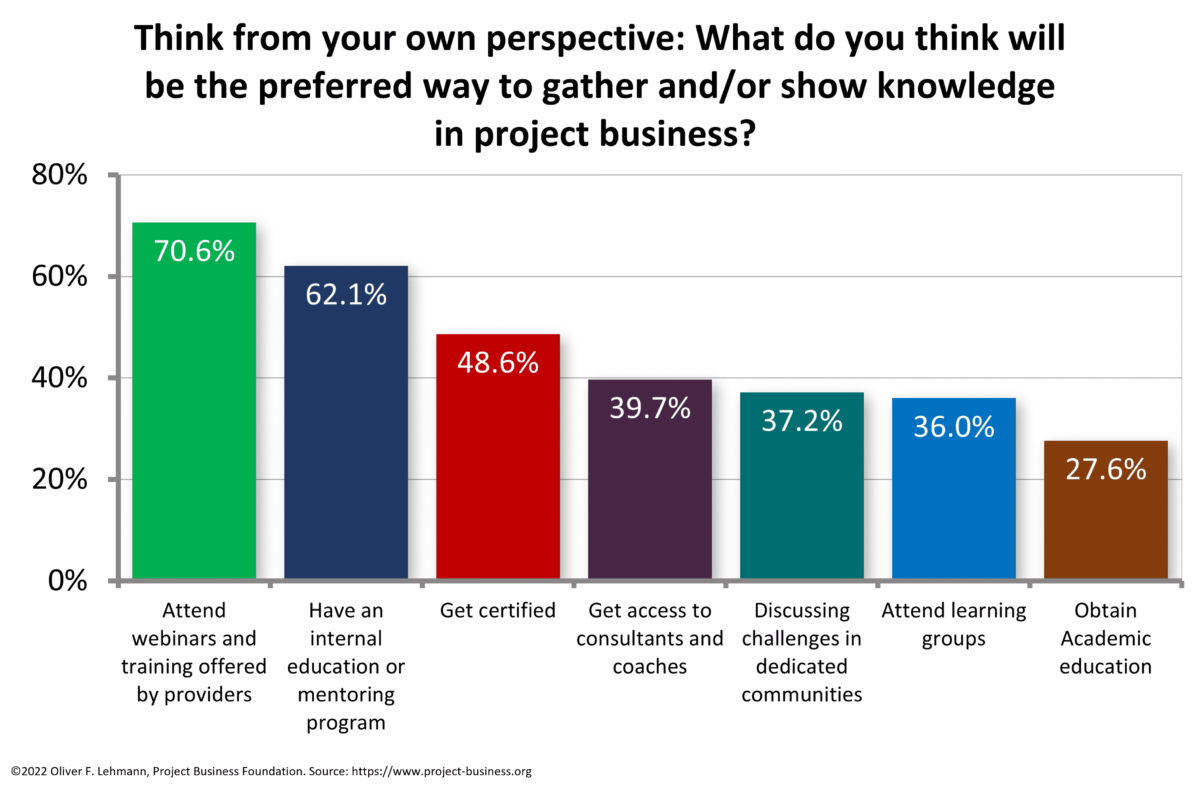

5. Roles in Project Business
Responses for this question: 502
We asked the respondents about their role in Project Business.
77.3% said, that they are in the role of a project manager either on customer or contractor side, or working for prime contractors.
Prime contractors are both contractors for the projects customer and buying from suvbcontractors.
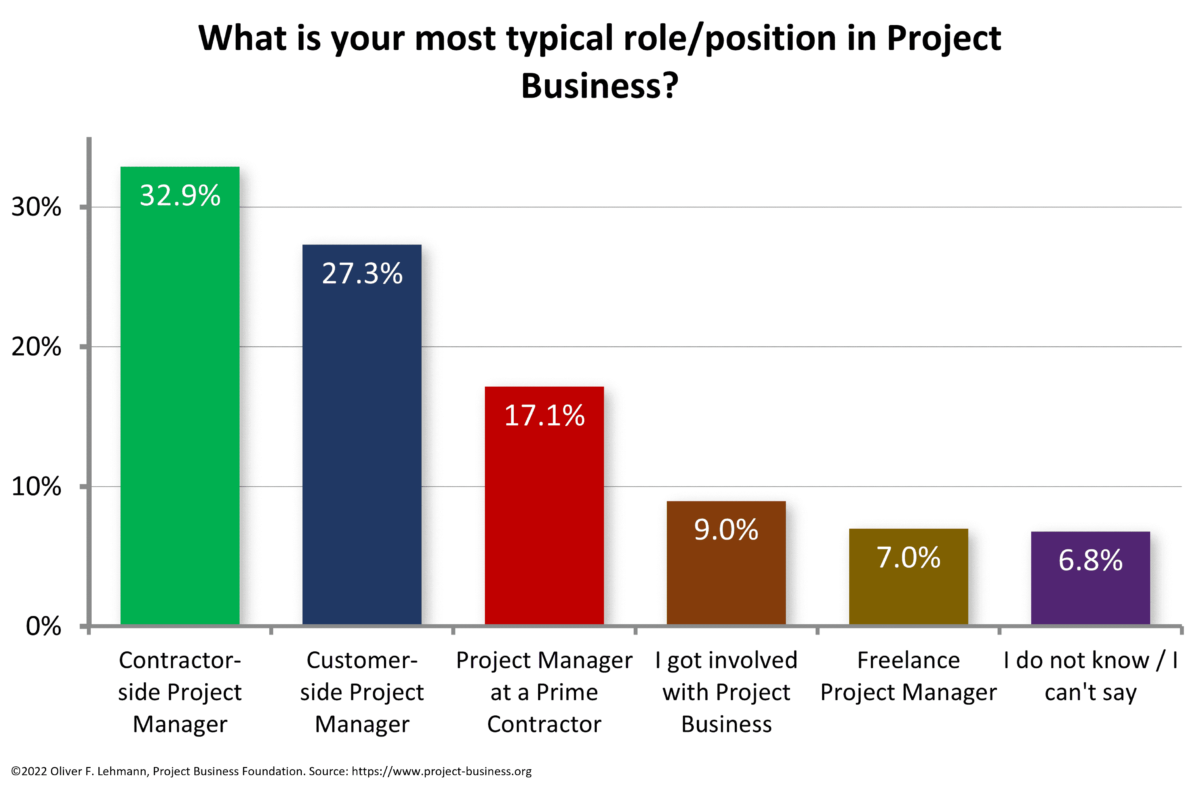
The diagram shows the distribution of the responses to 3. (Have you received specific education?) for each of this group.
The lowest number of “yes” responses is in the group of prime contractors. This is concerning, because their employer is both a contractor (to the customer) and a customer (of subcontractors). This is the group for which education in Project Business Management should be most relevant and have the shortest payback period.
We also see freelance project managers with a low rate of education. This is expectable, as they have to self-pay their education instead of getting it sponsored by an employer.
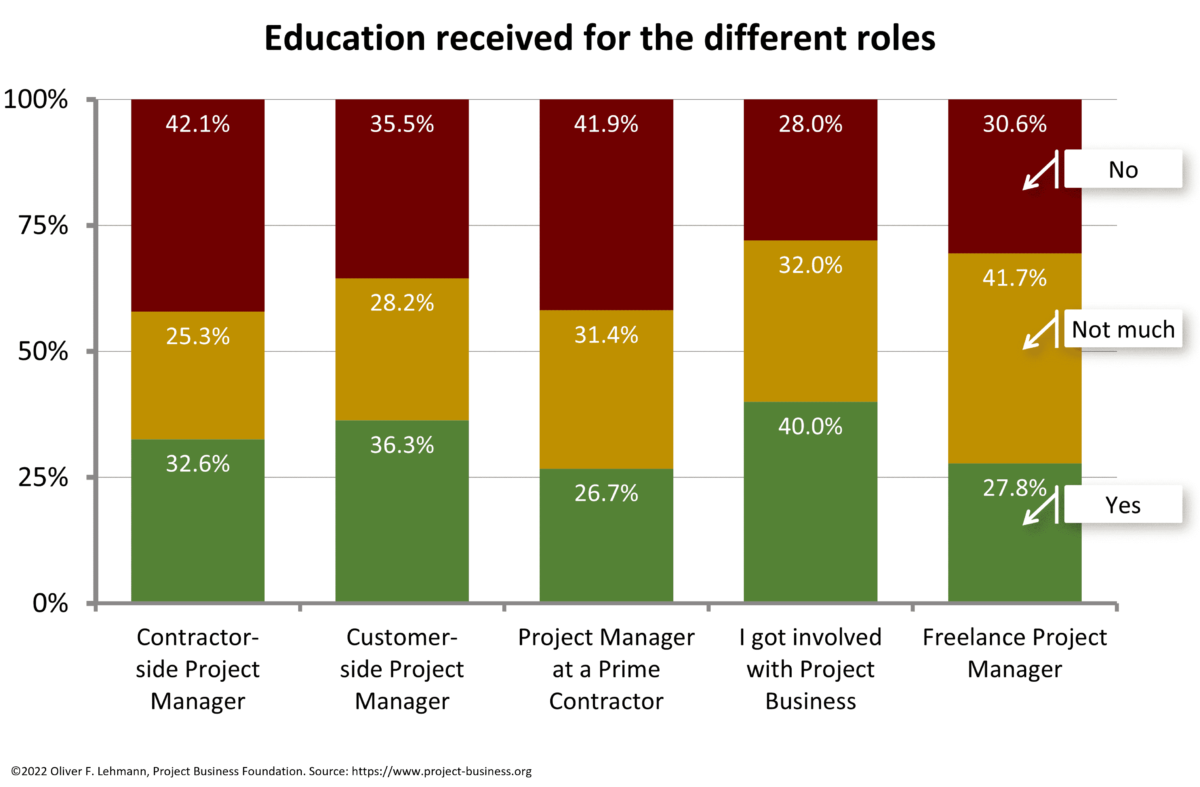

6. Project Sizes
Responses for this question: 503
Another question related to project size, measured in number of people involved from start to finish.
The largest group among the respondents to the survey was involved with projects between 11 and 100 people.
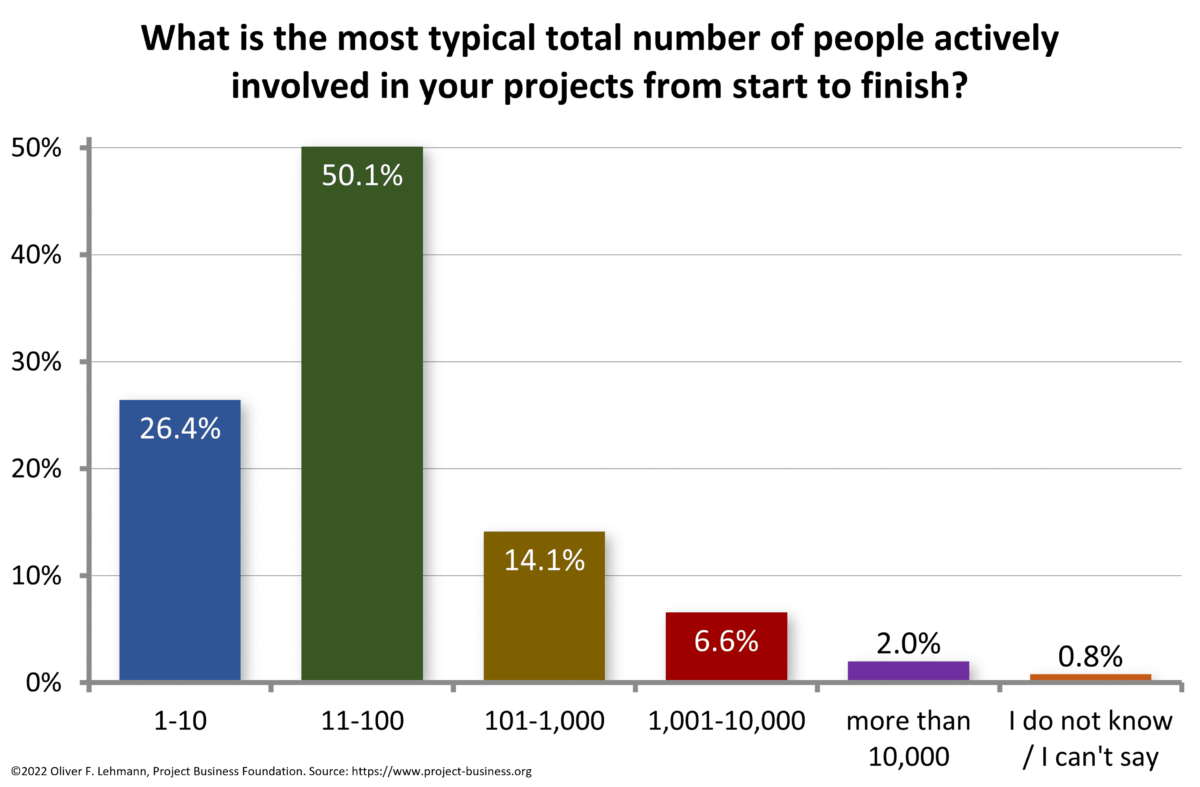
This result shows that with increasing project size, our respondents reported a reduction in education for project business. Larger projects have more risks than smaller ones and tend to be more international, so this is a concerning result.
NB: Due to the small number of 10 responses, we left out the cohort with projects that have more than 10,000 people involved.
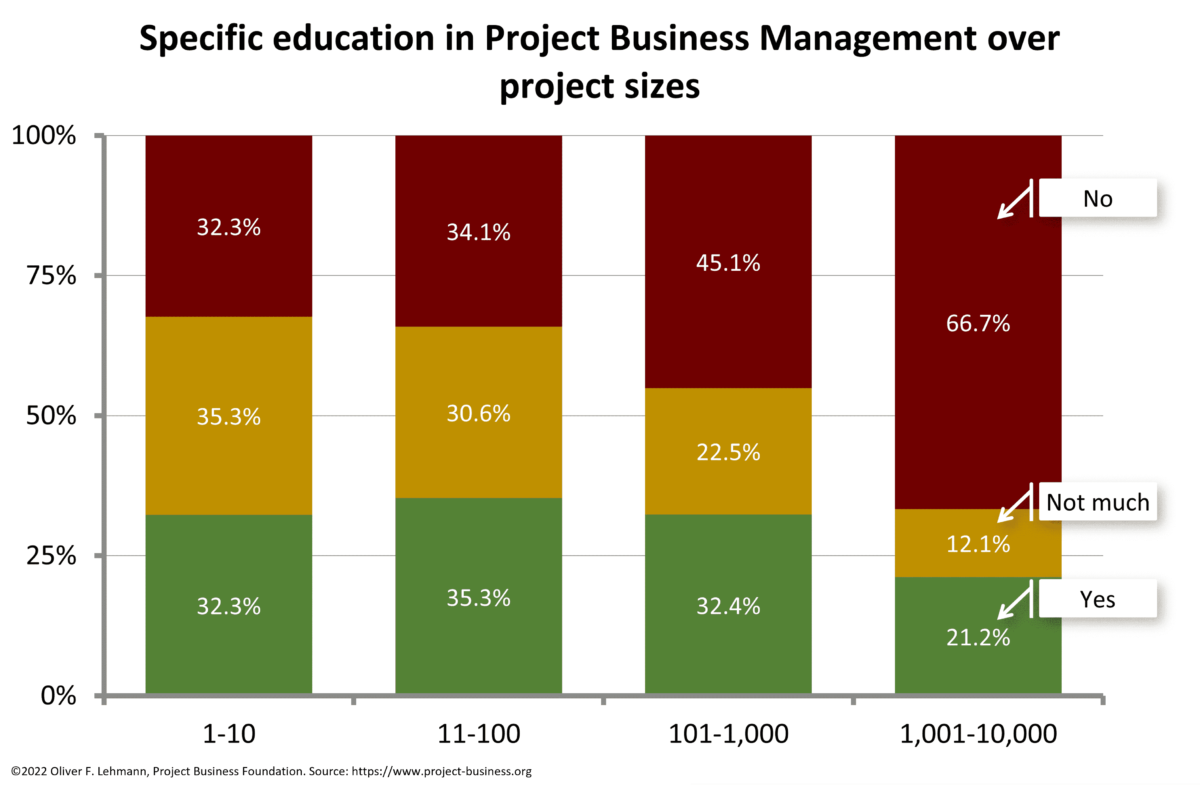

7. World Regions
Responses for this question: 502:
We defined seven world regions and asked participants where they came from.
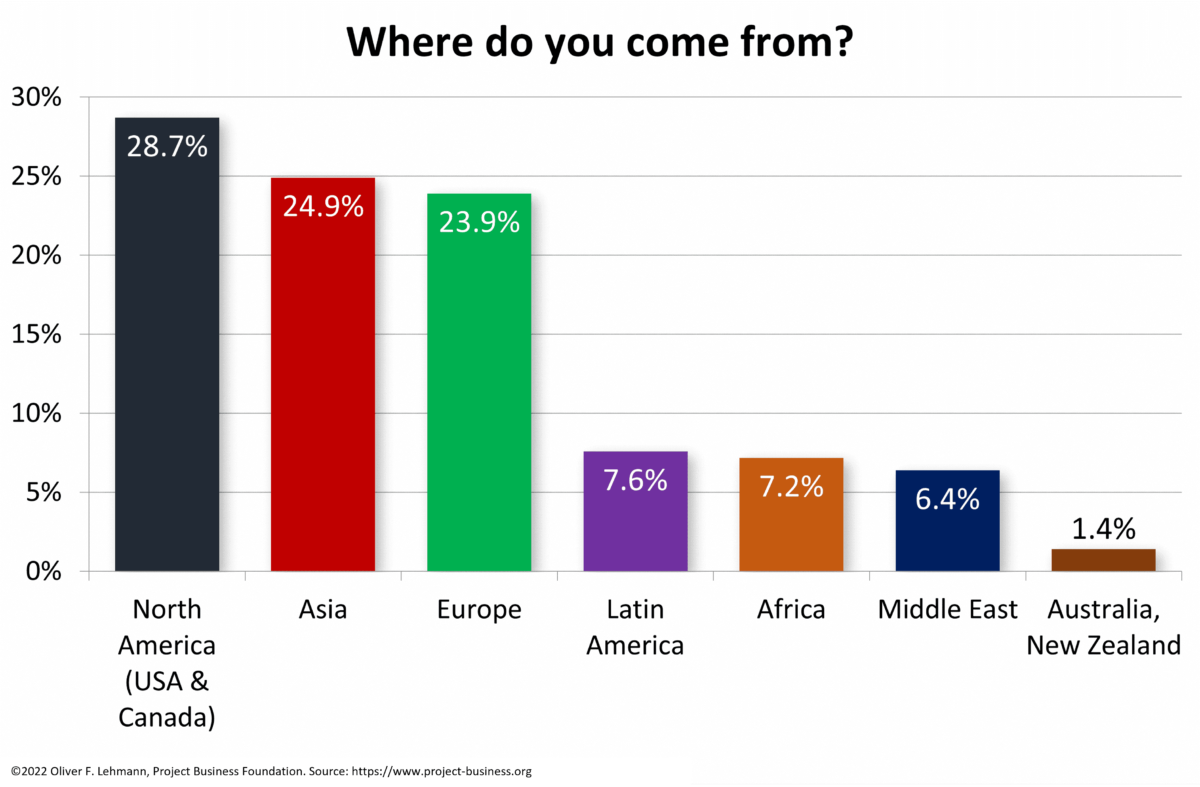
According to their responses, people from North America seemed to have the highest number of well-educated experts in Project Business Management. Middle East reported the smallest number.
NB: Due to the small number of 7 responses, we left out the cohort with projects from Australia/New Zealand.
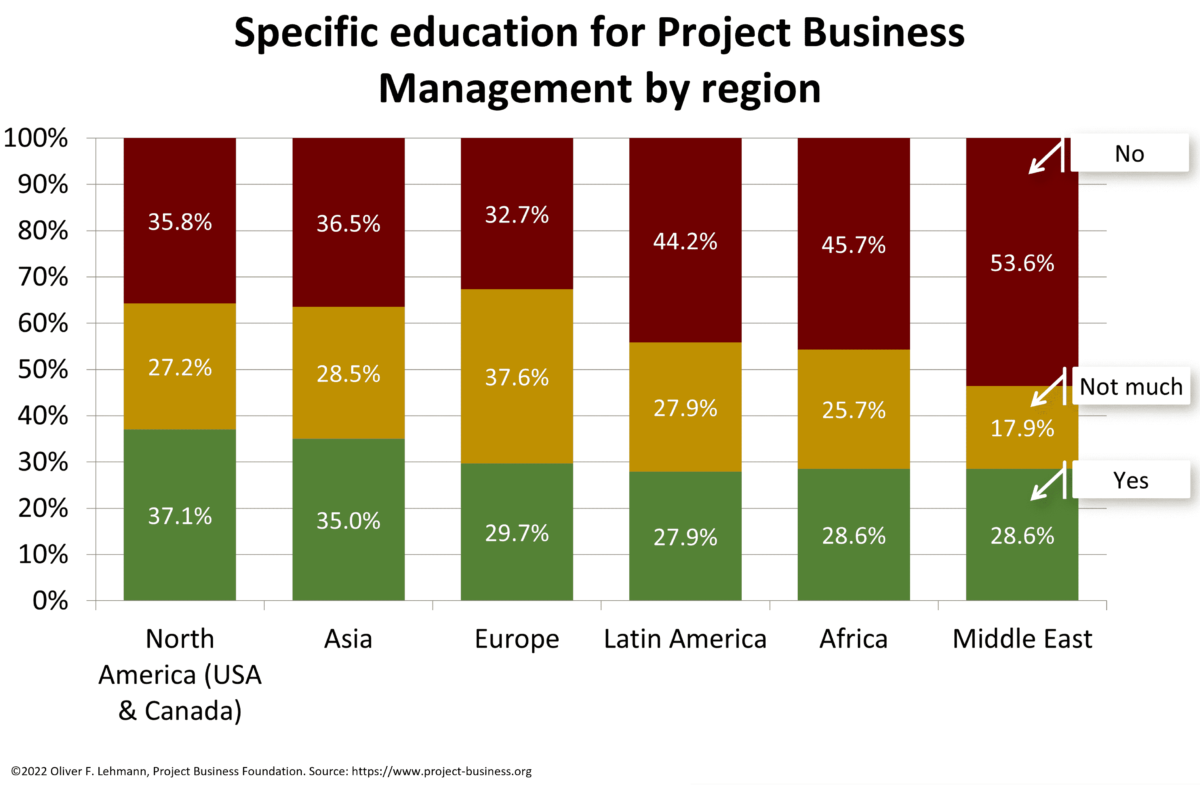

8. Conclusions

The survey adds knowledge on Project Business Management that was not available before:
- Practitioners reported that there is a need for formal education in Project Business Management.
- Practitioners further reported that for 2/3 of them, such education is only provided to a small degree, or not at all.
- The lack of education was reported by the different players in the field of Project Business, such as customer- and contractor-side project managers and freelancers.
- The preferred learning method are seminars and webinars from external providers. On the second place on the list of the most preferred methods were internal education and mentoring programs. Professional certification was on place 3.
- The lack of education can be found in project of all sizes and in all world regions.
The Project Business Foundation will expand its offerings to meet the identified need and give practitioners opportunities to be better prepared for the challenges and risks of their job.

9. A Selection of Participants’ Comments
Survey participants could leave a message. Here is what they told us.
For several years I was PM from a Customer’s side, now I am from a Contractor’s sid
This feels like a new frontier. My mgt is more interested in business than project management, always has been that way, and they get paid for developing business.
Adopting a Project Business outlook to projects requires a large set of skills that goes beyond what is actually taught in traditional PM trainings.
Here in China, there is no education on project management. Things are worse when you do customer projects.
Governments business in construction for health care so most of the time it will be contracted out no in house capabilities. PMs, QA, are in house the rest is outsourced.
PM is a critical skill that is encouraged but not often not provide. It is an after hours effort by individuals.
Project Business is not only about the project, it is also about the business. A magnific outstanding project can be an enormous failure from the business perspective, therefore business education is needed.
Practical exposure helps and concepts can be applied to practical problems so it’s a mix of both worlds. Only challenge is how we can get rid of diplomacy and political things.
Interesting topic. A lot to learn.
Very important to know the steps and how to accomplish your goal. Each project is different.
Keep learning and keep educating
Interested to join in this research.
Are there any certifications for this?
The knowledge in business formation is very important in this moment.
Any training course available for Project Business from an Academy?
The most useful education for project managers are through informal education (mentoring & coaching).
How to keep the contractors engaged after the project completion or hand-over to customer in order to ensure the business objective is achieved.
Continue your amazing work to educate people in project business. I am looking forward to more webinars.
From a personal perspective it is important to somewhat formalize internal education towards formal education. PMI still offers a reputation here.
Some high level managers and leaders do not understand or value the importance of having project management skills and education for their employees and applying these skills.
Being involved/informed about purpose and expected outcomes of a project in early stages of discussion is critical and eliminates endless Initiation Phase meetings with possible stakeholders. To be selected as Program/Project Manager for global initiatives, after basic initial decisions, is wasteful. Provide the Project Charter and empower the PM, EARLY, for better clarity and results. This will certainly improve time-budget-schedule targets.
I witness how the company goals and objectives are being confused and the actions to achieve them are modeled in a very complicated array obtaining undesirable results. The procedures and methods must be simple and tailored according to the company’s goals, to do so, the relevant information and mentor has to be available to generate the model.
Note: Some comments were carefully edited for grammar, capitalization, and punctuation.

Appendix: The Method – How We Asked People
We wanted to know: What is the need for professional education in the discipline of Project Business Management, and do practitioners receive that?
So we asked practitioners from the field.
The survey was held globally and was open from 09 February to 03 March 2022. It was closed after 534 responses.
The survey platform was on Surveymonkey, where the original results are still accessible.
Questions 1 & 2:
For the first two forced-choice questions (points 2 and 3 in this report), radio buttons were used that allowed selecting one answer. Answers to these two questions were mandatory to finish the tests. All following questions could be skipped.
Question 3:
The third question (point 4 in this report) related to prefered methods of conveying knowledge. This question was open choice, i.e. participants could use checkboxes to select several answers. The 514 respondents who answered this question selected on average 3.2 answers.
They also could add own recommendations. This additional option was used by 23 respondents, who mostly focused on employer-internal programs.
Questions 4 to 6:
These are described as points 5 to 7 in this report. The question type was again forced choice , allowing only one option. Here, we used drop-down fields to enable participants to answer these non-mandatory questions.
Additional fields:
Two additional fields allowed participants to leave an e-mail address so that we could inform them about the results and a free text field to add comments.
